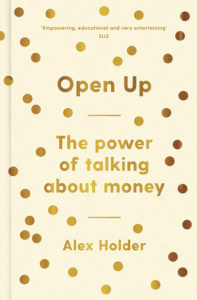Too often, how we make money defines us.
If there’s a talking head on TV, we’re given three pieces of information: Sue, 33, accountant. Many common surnames come from trades: Mason, Smith, Taylor, Cook. Our job titles have been so tightly tied to our identity. Yet many of us don’t, and don’t want to, self-identify as a job title. It is a real problem within our culture that one of the first things people want to know about us is how we make money.
When you’re asked, “What do you do?” you’re expected to answer with what you do to make money. If you balance spreadsheets for a living but your hobby is making bread, you’re not supposed to say “bread-maker”. No, Sue – until you’ve commercialised it, you can’t identify as it. For so long, society has hinged so much of our success and status on our job title and salary. But what can you really tell from a job title? “Creative director” might sound interesting, creative, dynamic and very “in charge”, but the reality could be miniature sandwiches in boardrooms and debating average typography. Equally, an “influencer”, with a huge following and great clothes, might spend most of her time crying about the comments she receives from strangers about her parenting.
Brilliantly, we’ve started to decouple success from money and power, and reject that there is only one way to be successful. Arianna Huffington wrote a manifesto to redefine success “beyond the two pillars of money and power” in her book Thrive. Tom Hodgkinson rallied for an antidote to a work-obsessed culture in his book How to be Idle, and Emma Gannon de-stigmatised the “slashie” by renaming them “multi-hyphenates”.
These books are all pushing against a real problem. We’ve been sold success as a singular destination, that if you work hard enough you’ll get there, and then you’ll be happy. The problem with this “dream” is that no one knows what a let-down money and status can be until they’ve dedicated years of their life working towards them. “At school we’re conditioned to be ambitious, go-getting and to achieve our potential,” says Katie, who worked for Nike for many years. “You do it because you’re promised that the higher you climb, the better life will be. But what I saw at the company I worked my ass off for in my 20s was that by 32 everyone had divided into two packs: those who wanted a better life, who realised that while on paper the job looked great, the day-to-day reality was toxic and pretty demoralising; and then there were those who were okay as long as it sounded really good at a New York cocktail party.”
I speak to many people who have worked hard to reach a certain position only to get there and realise that it’s, well, just another job title, not paradise. We’re learning success doesn’t have to be a meteoric rise to the top in pursuit of a bigger salary, but if it isn’t that, what does it look like? Freelance? Founder? Part-time florist? Stay-at-home dad? The current conversation is redefining success as a work-life balance, but is it all positive? Brittany Bathgate, a fashion blogger with 220K Instagram followers, left her retail job with a steady salary to work for herself earlier this year. “But adjusting to freelance has been hard,” she says. “Some days I didn’t even want to get out of bed. It’s definitely not the answer for everyone.” A friend I often work with raises another very good point: “If we’re heroing people who choose a life balance, what does it mean in real terms? Say I told you I wasn’t that bothered about getting to the top in my field, how would you as my colleague feel about that? Would that colour your view of my ability to do my job?”
And of course, we all have salary expectations. We need to pay bills and rent. We have families to support, friends to drink with and weddings to get to. But we should always be mindful just how much money and status figure into our decision-making. If money and status are the two primary reasons you’ve accepted a job, then you are probably not going to be happy in that role for long. If you find what you do morally reprehensible, if your colleagues annoy the hell out of you, or you’re just bored a lot of the time, then you should question why you are doing it. You might have the job title, you might have the salary, but those things don’t always result in a better life. As Tim Ferriss, author of The 4-Hour Workweek, says, “If you ever find yourself saying, ‘But the money is good,’ then you’re probably in the wrong job.”
There are numbers other than our salary that we judge success by: followers and likes. Success on the internet can feel similar to the success of landing a prestigious job: short-lived euphoria rather than contentment. I wonder if this is because they both depend on comparing favourably to others. I spoke to the world’s first comparison coach, Lucy Sheridan, and asked about the dangers of judging success by comparison. “In terms of how we define our own success, we should make sure we’re looking at examples of other people as stimulus only. Not with, ‘That’s the way to do it,’ but, ‘That’s a way to do it – what does that mean for me?’”
Lucy also warns of not being blinded by other people’s success. “Typically, an overnight success is about three years working hard behind the scenes. People who come out with a successful product, book, launch, etc – they work their arses off for ages and finally there’s a tipping point, and suddenly the snowball takes itself down the mountain and you don’t have to touch it. But on social media that success looks like it came about quickly.”
As Katherine Ormerod writes in her book Why Social Media is Ruining Your Life, “While you might roll your eyes at hearing social media stars talk about their workload, it’s worth remembering that if it were so easy to build a successful social media business, everyone would have quit their jobs and be running successful YouTube channels by now. Most social media mavens are workaholics, who don’t really understand the meaning of downtime, and the competition is fierce.”As a rule, whether online or off, more money tends to mean more work and stress. It used to be thought that money allowed a life of leisure, but that’s no longer the case. There is always a price for more money (time, sanity, responsibility, autonomy). And when I asked “rich” people how they felt about money, we saw they didn’t feel rich, they wanted more, which begs the question: how much more of their time and sanity are they willing to give?
We fetishise work and working. We live in a very busy society. I’m “busy”, my friends are “busy”; as Tom Hodgkinson wrote in How to Be Free, “When people say, ‘I just don’t have enough time,’ they mean, ‘I prioritised something else.’” It’s said that Apple CEO Tim Cook routinely begins emailing employees at 4.30am, and that former Yahoo CEO Marissa Mayer worked 130-hour weeks. If the successful and rich are just working more, then are they really successful? Should we not assess what might be lost in life in the pursuit of money and “success”? Many of us find ourselves in an industry where, because we’ve worked hard for our position, the industry’s markers of success really begin to matter to us – after all, it’s what we are surrounded with all day. It’s not to say being on an upward trajectory can’t be motivating and rewarding, but it’s easy, when we’re amongst it, to be blinded by a very prescriptive version of success: getting to be a “level two” at work, or “partner” or chartered” or “published”.
Another reason it’s important to know who you are without your job is because they don’t last forever. I’ve heard redundancy described as a form of identity theft. It’s not just money worries and job security that causes the psychological crisis that can happen after redundancy. Not feeling valued, not having a place to go every day, no longer having that camaraderie with colleagues, and a loss of identity are all thought to have effects as great as the financial strain of losing a job. Liv Siddall started a warm, chatty podcast called Redundancy Radio after, you guessed it, being made redundant. I asked her how she chose the name. “My dad kept saying to me at the time, ‘You are not “redundant.”’ Just say that you left, don’t tell anyone you were made redundant. Don’t use that word,’ but by talking about it and owning it, it doesn’t define me.”
Success is many things: to many people it’s a blue tick, it’s money, it’s life balance, it’s driving an Audi, it’s owning redundancy. But true success is the freedom to make choices. Sheryl Sandberg, Lean In author and chief operating officer of Facebook, gave us the term “jungle gym” to replace the tired “career ladder”. “There’s only one way to get to the top of a ladder but there are many ways to get to the top of a jungle gym. Plus a jungle gym provides great views for many people, not just those at the top.” Who says we shouldn’t apply that thought to salary? The idea that salary should go up and up until we take our pension is not only exhausting but untenable – most of us will experience change in our working lives that will be reflected in our salaries, and that’s okay. Wouldn’t it be better to measure success by thinking of it as a path where the more accomplished we become, the more choices we have – about the work we do and how we spend our time?

This is an edited extract from Open Up: The Power of Talking about Money by Alex Holder (Allen & Unwin, $28.)
This article originally appeared in Fashion Quarterly Issue 3, 2019.






